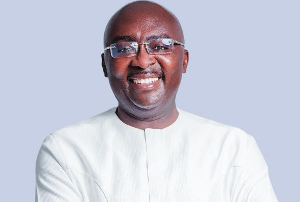 Vice President, Dr. Mahamudu Bawumia is the flagbearer of NPP
Vice President, Dr. Mahamudu Bawumia is the flagbearer of NPP
The flagbearer of the New Patriotic Party (NPP), Dr. Mahamudu Bawumia, has announced plans to introduce a growth mindset curriculum in schools if elected president.
Speaking at the launch of the party's manifesto on Sunday, August 18, 2024, he said the move would ensure that Ghanaian children are socialized to have a mindset of possibilities.
He pointed out that Ghanaians need to have a mindset of possibilities instead of impossibilities, lamenting the critical lack of such a mindset, which is reflected in the absence of core values, principles, and patriotism.
“This mindset of possibilities must be inculcated in our children from home and in school. This is why we are going to introduce a growth mindset curriculum to help students build critical skills such as problem-solving, risk-taking, opportunity spotting, and design thinking.
“We must collectively have a mindset of possibilities and not impossibilities. There is a critical failure of mindset that manifests itself in the absence of core values, patriotism, and principles within our society. We need to invigorate the can-do spirit of the Ghanaian to believe that we can even do better than we ever imagined if we put our minds to it,” he explained.
But what exactly is a growth mindset curriculum?
A mindset is generally defined as one's mental attitude, inclination, or state of mind—a fixed state of mind by many definitions.
A person’s mindset combines their intelligence, personality, and talent, as well as their experiences, education, prejudices, and other informative factors.
In her decades of research on achievement and success, psychologist Carol Dweck identified two types of mindsets: fixed and growth.
Her research found that people with a fixed mindset believe their qualities and talents are unchangeable and that talent is a prerequisite for success, while those with a growth mindset take the approach that their most basic abilities can be nurtured through hard work and dedication.
Impact of growth mindset on learning outcomes
A recent study on growth mindset interventions and students' motivation and resilience in the United States revealed a significant positive impact on students' motivation in educational settings, enhanced resilience, and improved educational outcomes, engagement, resilience, and persistence.
It noted that some practical strategies employed by educators to implement growth mindset interventions effectively included providing explicit instruction, fostering a supportive classroom culture, teaching effective learning strategies, providing feedback that promotes a growth mindset, encouraging reflection and metacognition, modelling a growth mindset, and leveraging technology and digital resources.
As the research suggests, the introduction of a growth mindset curriculum can lead to improvements in Ghana's educational system, enabling students to maximize their potential.
JKB/BB
Watch a documentary on Uncle Ebo Whyte below: